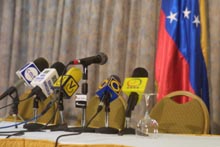
The opposite of freedom
It sounds a bit melodramatic, I know, but in Spanish the post of Human Rights Ombudsman is translated as Defensor del Pueblo - literally "defender of the people." Switch just a couple of letters around and you end up with Defensor del Puesto – Defender of his Post. Sure, it’s a silly pun, but still, it gets some smiles. Mostly it's fun because "Defensor del Puesto" is a far more accurate description of what our Human Rights Ombudsman, Germán Mundaraín, actually does, given his craven toadying towards the president and his obvious fear of doing anything that might anger him and undermine his position.
And you want to hear what's alarming?
Pretty soon, using that pun on the radio or on television is going to be against the law here.
Say "defensor del puesto" in front of a microphone and you'll face fines worth tens of thousands of dollars. The station you're on will risk losing its broadcast license. The pun is clearly disrespectful to our honorable Ombudsman, and under Chávez’s soon-to-be-approved Media Contents Law you’re just not allowed to say such things on the air.
Now, another thing that hasn’t made me any friends is my criticism of Venezuela’s private media – which long ago decided that political activism is much more fun than, y’know, actually reporting. Of course, I decided that too, but when I did, I realized the only honest course of action was to stop working as a reporter. The Venezuelan TV networks, on the other hand, continue to pretend to produce journalism even though it's clear that what they're all about is putting out as much material damaging to the government as they can.
Of course, the government has become so thuggish that making it look bad on TV is not particularly challenging. The proliferation of amateur videos showing chavista activists attacking opposition gatherings, often shooting guns into opposition crowds, is the most striking example. Those videos are for real, as are the reams of self-destructive presidential statements, the burping generals, the footage of soldiers beating on opposition activsts, or any of the long list of moronic own-goals the government has been scoring in plain view of the TV cameras. You don't need some sort of sophisticated media dirty tricks lab to make the government look thuggish on TV, as the chavistas would have it. No, you just have to put a camera in front of them and hit record.
Obviously the constant negative coverage is a problem for the government, and they've decided enough is enough. The government’s moving against the TV and radio stations in characteristically brutish style, with a a Media Content Law that looks like something straight out of the 1930s.
The bill bans broadcasting contents that “promote, condone or incite disrespect for the legitimate authorities and institutions, such as: members of the National Assembly, President of the Republic, Vicepresident, ministers, Supreme Tribunal Magistrates, Attorney General, Ombudsman, Comptroller General, CNE and Military authorities.”
Zo-wee! They sure didn’t leave anyone out, did they?!
It kills me that some first-world lefties still defend the Chávez government. Wake up, people: these people want to make it illegal for anyone to criticize them on the air! That's now characterized as a “very grave infraction” within the Contents' Law. Other new infractions include promoting, condoning or inciting either war, altering public order, committing crimes or doing anything against the "security of the nation." No doubt they'll gift us a friendly board of military men to decide just what does and what does not imperil the security of the nation, or what constitutes promoting disrespect against the Comptroller General, or what counts as incietement to public disorder. And they'll call the people on that board anything you can think of other than "censors," but that's exactly what they'll be.
How is it that Americans and Europeans who would have a triple-conniption at any initiative back home that was one fiftieth as dangerous to freedom of speech as this still sympathize with Chávez?
Under the bill, violating any of these new rules will justify a punitive 48 hour shutdown of the TV or radio station involved. Two such closures within 3 years are grounds for the final suspension of the broadcaster’s concession, effectively shutting them down for good. How long could it take until that starts happening?
It’s perfectly obvious that Chávez doesn’t give a rat’s ass about the ethics of journalism – you only have to spend 10 minutes watching state TV to understand that. What he wants is complete impunity, he wants to be able to give his underlings any orders at all without the whole world hearing about it. He can't do that while there's an independent media out there covering him, much less if that media is committed to shining a spotlight on every little abuse of power he perpetrates.
In other words, the days of Authoritarianism Lite are at an end. Any debate on the fine points of journalistic ethics and deontology wither into indifference in the face of this autocratic onslaught. The government wants the private broadcasters shut down not because of how often they lie, but because of how often they tell the truth.
The international community must issue an emphatic rejection to this authoritarian lunacy. They're really going too far now.
